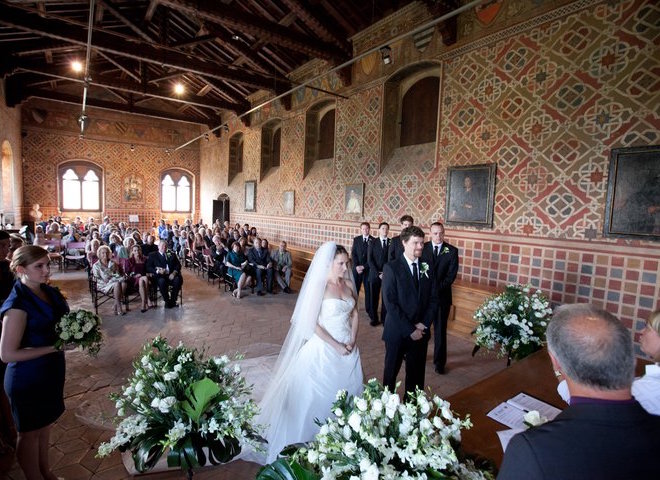
Hundreds of ceremonies were already set, villas and historic homes in Val d’Orcia and Florence already booked, and catering and floral arrangements decided. Then the coronavirus hit Italy forcing future newlyweds to give up their dream fairytale wedding in Tuscany. The original uncertainty surrounding health concerns prompted couples to be cautious and postpone their wedding to another dates after the “storm” had passed. In fact, 60% have chosen to reschedule their wedding for 2021, hoping they may celebrate this milestone without too many restrictions, as in the case of a Tuscan couple who went ahead with their ceremony at the height of the COVID-19 emergency (see story).
Meanwhile, the wedding market and the destination wedding trend––which is popular in Tuscany––have come to a full stop. About 5,000 companies including florists, hairdressers, beauticians, photographers, artisans, and other related companies are waiting to learn the government’s decisions on when it will be possible to return to planning big events, which at the moment are paused.
The ramifications of the lack of weddings due to the emergency are not comparable to other across the country, but still signify an impact on the industry. Carlotta Ferrari, president of the Destination Florence Convention and Visitors Bureau, as well as of the Convention Bureau Italia, stated there was expected to be significant growth in turnover and numbers of weddings in 2020. However, recent data suggests there will be a major drop of around 80% in both areas. This statistic is particularly significant as in the past few years about 2,700 weddings have been organized in Tuscany with an estimated turnover of over 170 million euros.
Ferrari, who speaks on the behalf of organizations which promote large events in Tuscany and Italy abroad, explained that the lack of responses from the government intensifies this stress. She goes on to say that even if the situation were to improve in the second half of the year, the future months of inactivity will still affect the industry. Even with the couples who have confirmed their ceremonies for after the summer, it will still be difficult for many small businesses to recover and move forward.
This reality has certain implications for Tuscany, which represents 30% of the Italian market for international weddings. The region is certainly one of the most popular destination for engaged couples all over the world. Out of the top cities chosen for the special day, 15% of ceremonies take place in Florence, with Fiesole, Certaldo, Greve in Chianti, Cortona and Siena in tow.
Many foreigners chose to get married in Italy or Tuscany because of how Italians know how to celebrate, and the warmth which goes into planning each event. Marriage is a moment of sharing and happiness, explains Ferrari, so having to think about following protocols and social distancing is not ideal for many couples––the same couples who have chosen to postpone. On the flip side, for those who have not yet chosen to cancel or postpone, it is difficult to make the decision if regulations are not made clear sooner rather than later.
This feeling of uncertainty is not an isolated case. Owners of businesses in the wedding industry, such as wedding planners among others, feel forgotten. In recent years, this sector has continued to grow and become an investment opportunity for small and medium-sized enterprises which are now suffering, while larger institutions can more easily carry on amidst uncertainty.
While some perceive the wedding industry to be seasonal, this is not the case for some companies which work all year round. Giulia Bertucelli, a wedding planner from Pisa, has been organizing weddings for 10 years. She was supposed to organize 12 weddings this year––more than half for foreign couples––all of which have been postponed. This decision was particularly hard for couples as they had to consider quarantine and the lockdown of borders––certainly not factors which one wants their spouses or guests to have to think about on a day meant to be filled with celebration and serenity. Foreign weddings also have an impact on the tourism sector as many guests chose to stay in Tuscany for a vacation in addition to the big day.
Nonetheless, there is still hope for what the year of 2021 will bring for the wedding industry and Italy as a country. Companies are not only in contact with couples who have rescheduled events, but also newly engaged couples who are already contacting wedding planners to coordinate their wedding in 2021. Couples have been very understanding of what is and is not possible, explains Bertucelli. Perhaps the biggest difficulty in these months has been not being able to give concrete answers. Bertucelli goes on to speak on behalf of the entire industry, when she asks the larger institutions to pay attention and give smaller agencies answers. The pandemic may have hit Italy hardest at the close of February––a month symbolic of love––but Italians remain dedicated to sharing their warmth with future newlyweds from around their country and the world. (elizabeth berry)







